Oscars 2024: ‘Oppenheimer’ cleans up, ‘Zone of Interest’ director calls out Israel
These are the top Jewish moments from this year’s Academy Awards
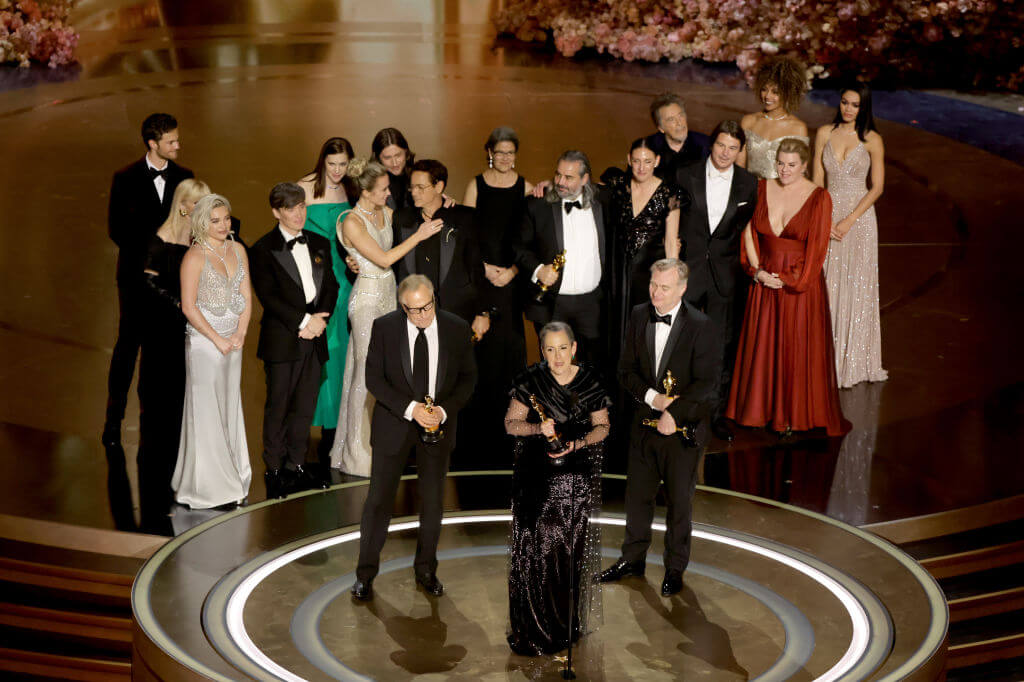
Cast and crew of ‘Oppenheimer’ take the stage to celebrate the film’s final win, for Best Picture. Photo by Getty Images
Oppenheimer, Christopher Nolan’s film about the Jewish creator of the atomic bomb, won big on Sunday at the Academy Awards, surprising no one — it was a favorite in most of the 13 categories in which it was nominated, including Best Picture and Best Actor.
But perhaps the most notable moment of the evening came after The Zone of Interest won Best Foreign Language Film, when director Jonathan Glazer used his acceptance speech to condemn Israel’s military actions in Gaza, and draw parallels between his Holocaust film and current events.
“Our film shows where dehumanization leads at its worst,” said Glazer, who is Jewish, in his acceptance speech. He then went on to strongly condemn “Jewishness and the Holocaust being hijacked by an occupation, which has led to conflict for so many innocent people.”
Many actors wore red pins from the group Artists4Ceasefire on the red carpet. And pro-Palestinian protesters demonstrated outside the theater, as well as blocking the roads — causing some guests to exit their cars and walk to the ceremony. The Forward’s crack culture team broke it all down as it unfolded.
Red ceasefire pins on the red carpet
Mira Fox: Tuning into the red carpet and just saw Taika Waititi posing with Rita Ora — the Jewish-Maori director was nominated for Holocaust film Jojo Rabbit in 2019. (He also played Hitler.)
Talya Zax: Thrilled to see Fran Drescher, union queen, showing up in an Ariana Grande-high ponytail. A fashion icon in The Nanny; a fashion icon always.
There’s been some talk of the war on the red carpet. Ramy Youssef, who stars in Poor Things, showed up with an Artists4Ceasefire pin; so did Billie Eilish and her brother, Finneas. Some other attendees also signed a letter from the group Artists4Ceasefire, including America Ferrera, who is up for Best Supporting Actress for her performance in Barbie.
Ramy Youssef gushes over his friendship with Taylor Swift as she was seen at one of his standup shows in New York. #Oscars pic.twitter.com/wC61rkvsia
— Entertainment Tonight (@etnow) March 10, 2024
PJ Grisar: I think the first time we saw those pins at an awards show was when the band boygenius donned them at the Grammys. Mark Ruffalo (nominated for supporting actor) also wore one at the DGA awards. Some people are wearing Palestinian flag pins, including Swann Arlaud from Anatomy of a Fall. And there are protesters with “Free Palestine” placards outside, although you can’t hear them over the general red carpet din.
Some trivia in the ABC preshow: Robert De Niro did a screen test to play Sonny in The Godfather, which would have changed the storied history of Jews playing Italians, had he edged out James Caan.
Irene Katz Connelly: With the exception of a few high-profile advocates for a ceasefire, most attendees walking the red carpet are not bringing up Gaza. Hosts are sticking to familiar topics, like fashion, award hopes and Oscars lore
PJ: Just realized that between Jodie Foster and Robert Downey, Jr., we have two Mel Gibson apologists up for featured actor awards. Seems like more evidence that the idea that Gibson has been canceled is kinda laughable.
Mira: Appreciate Jodie Foster announcing that she was keeping her Oscars in the bathroom until they started to corrode.
Talya: Mira, I was just coming here to say that! Great to see Paul Giamatti right after her — he falls into my personal category of not Jewish, but also, you know, pretty Jewish
PJ: He did play Harvey Pekar (and Jerry Heller). Jews as Italians; Italians as Jews.
Talya: Team, what are we wearing to the Oscars this year? I’m in full Uniqlo sweats, but I did put on nice earrings to mark the occasion.
PJ: I am sporting a threadbare maroon Gap long-sleeve tee, jeans and a pair of Adidas.
Irene: Let’s just say a lot of stretchy fabrics.
Mira: I just swapped out my jeans for sweatpants. But I am about to make martinis for my roommate and me, so there’s at least a small element of class.
Talya: PJ is wearing hard pants? PJ wins best dressed. Mira, what’s your martini recipe of choice?
PJ: They even have rivets.
Mira: Just use nice gin and nice vermouth and you can’t go wrong.
Bradley Cooper’s (real) nose in the spotlight
Mira: Monologue shouts out Bradley Cooper, who gets a long shot showing off his naturally large nose.
PJ: With his mom, naturally. Jimmy Kimmel just described The Zone of Interest — about a Nazi couple near Auschwitz — as what constitutes a romcom in Germany.
Mira: Also a nod to The Fabelmans, nominated for seven awards last year. Steven Spielberg is not nominated for anything this year but, as Kimmel put it, he has “season tickets.”
Also a mention of protections against artificial intelligence and the new SָAG-AFTRA contract — thanks in large part to Drescher, who Kimmel said has now returned to her regular volunteer work of “reading loudly” to children.
PJ: If this first acting award — supporting actress — is any indication it looks like they will present these awards with a group of former winners. Rita Moreno looks amazing but also a little like a Reese’s Cup wrapper.
Mira: I did love to see Moreno do a little “America” ditty on stage before reading America Ferrera’s nomination out loud. That was, of course, her big number in West Side Story, and it gives a little Leonard Bernstein throughline there, even before Maestro has its moment(s).
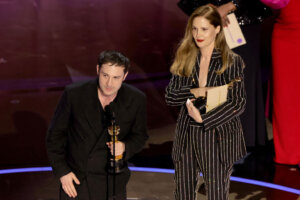
PJ: I believe that Arthur Harari, Justine Triet’s partner in life and in writing Anatomy of a Fall, which won for original screenplay, is Jewish, the grandson of Clément Harari, an Egyptian-French actor who played a rabbi in the film Train of Life, about Jews escaping the Holocaust for Mandatory Palestine. They began writing the film in lockdown during the early days of the COVID pandemic.
Mira: They desperately misspelled “reined in” in the subtitles for Maestro when they played the clip before its nomination for Best Original Screenplay. They spelled it “reign.” Wrong one!
Talya: I appreciate Cord Jefferson, winner of Best Adapted Screenplay for American Fiction, dwelling on trying to not be vindictive. It’s a bit like onstage therapy.
Maestro’s prosthetic nose gets the cold shoulder
PJ: Billie Eilish and Finneas, who just performed their nominated song “What Was I Made For” from Barbie, are not Jewish — but they previously appeared at an Oscars event dressed very much like frum hipsters, with Eilish wearing basically a tichel.
Talya: They’ve got a similar vibe going on tonight. My cousin, who I’m watching with, weighs in: “Billie really does look Haredi.”
Mira: I think she looked very Ruth Handler — the tweed blazer and headband gave business Barbie. And Handler, Barbie’s inventor, was a businesswoman above all.
Irene: Billie looks great, but no viewer should try these glasses at home.
Talya: Every once in a while when I hear this song I like to imagine it’s being sung by a golem. “What Was I Made For” is a deep question for Barbies and animate lumps of clay alike. Unrelatedly, Michael Keaton talking about plucking nose hairs while presenting the award for Best Makeup and Hairstyling is a canonically Jewish event.
Mira: I kind of can’t believe Maestro lost Best Makeup and Hairstyling. Sure, the nose was problematic, but Kazuhiro Tsuji, who did the prosthetics, is an industry hero — he was even one of the first credits to roll after the movie. He’s super sought-after and considered the master of the craft, and those kinds of industry politics often matter.
PJ: It’s possible folks realized it could have been controversial. I think the right movie won for this, honestly (Poor Things). In other news, Ari Aster rather infamously described the Poor Things sets as looking like the Cheesecake Factory. Joke’s on him — it just won Best Production Design.
Mira: John Cena seemingly appearing nude to present Best Costume Design. Fun fact: He follows most of the Forward staff on X.
The Zone of Interest win brings first speech about Gaza
Talya: Here’s the Robert Kraft-funded ad about a bomb threat at a synagogue. It’s based on a real incident, and is just the latest Kraft ad to run as part of his major wartime PSA campaign against “Jewish hate” — he also had one for the Super Bowl.
PJ: Zone of Interest won for best international film — probably the first to be directed by a person who doesn’t speak the language the film was in. Director Jonathan Glazer dedicated the win to a 90-year-old Polish woman he met who worked with the Resistance as a girl. We see a version of her in the film planting fruit in ditches dug by prisoners.
Irene: And it’s still up for Best Picture later in the night. Glazer says the film is meant to spotlight present as well as past atrocities, saying he wanted it to say: “Look what we do now.”
Jonathan Glazer’s acceptance speech for Best International Film for ‘THE ZONE OF INTEREST’ at the #Oscars pic.twitter.com/XNsMv0HDib
— Film Updates (@FilmUpdates) March 11, 2024
Mira: “Our film shows where dehumanization leads,” Glazer says. “Right now we stand here as men who refute their Jewishness and the Holocaust being hijacked by an occupation which has led to conflict for so many innocent people.”
Talya: Lots of applause for Glazer calling out the use of the narrative of the Holocaust for being used to justify Israeli war conduct now. Seems like people have perhaps been waiting for a chance to express feelings on that front.
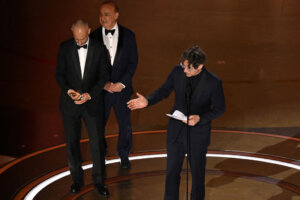
Irene: And The Zone of Interest provides a natural opening for that commentary. In a BAFTA acceptance speech earlier this year, the movie’s co-producer, James Wilson, tied the film to “innocent people killed in Gaza or Yemen” today.
PJ: It’s notable that Glazer made the case for the dehumanization of victims on both sides, including those killed and wounded on Oct. 7. Many critics have only applied the lessons of the film to Palestinian victims. (Mica Levi, who did the score, previously called for a ceasefire in their speech at the London Critics Circle Awards.)
Oppenheimer finally wins — Robert Downey Jr. for Best Supporting Actor
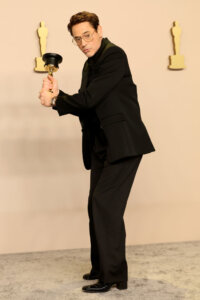
PJ: Robert Downey, Jr. won for his role in Oppenheimer as Lewis Strauss, who served as the president of Temple Emanu-El in New York. Very Jewish man — as his autobiography and archives at the American Jewish Historical Society both attest. Interestingly, he was an outspoken anti-Zionist before the creation of the state of Israel. Downey focused his speech on his rescue dog and his wife.
Mira: Please, who just clapped the paws of the dog, Messi from Anatomy of a Fall, for Robert Downey Jr., I must know.
Talya: Obligatory pitch for the Academy Museum, which is opening a permanent exhibit about Hollywood’s Jewish founders in May.
Mira: The Danny DeVito/Arnold Schwartzenegger height contrast as they present the award for Best Visual Effects and Best Film Editing is so extreme that it does seem like it must be trickery.
PJ: Mira, you must watch Twins ASAP.
Irene: Oppenheimer snags its second Oscar, this one for Film Editing. It started out as a relatively slow night so far for a film that was promoted as Oscar bait before it even premiered; as we move into some of the more prominent awards, that might change.
Spotlight on the war in Ukraine — and a flirtatious moment for Steven Spielberg
Mira: After the Maestro spot played, we got a good shot of the conductor of tonight’s orchestra, who did a spunky little dance as he conducted — which feels very Bernstein.
Talya: Mira, how are the martinis treating you?
Mira: Long gone, we’ve moved onto dinner.
Talya: Steven Spielberg comforting Kate McKinnon as she learns that Jurassic Park and its many sequels are not documentaries: Perfection. Steven Spielberg sheepishly revealing that he has been receiving the “tasteful nudes” McKinnon thought she was sending to Jeff Goldblum: Somehow even better.
Mira: The directors of 20 Days in Mariupol, which just won for Best Feature-length Documentary, made a very political speech about the war in Ukraine — which got notably less applause than Jonathan Glazer’s remarks about Gaza did.
Irene: I wonder if that’s because the Ukrainian cause already enjoys widespread support in Hollywood and the U.S. more generally.
Talya: The Oscars also have a complicated history with the Ukraine war conflict. They rejected President Volodymyr Zelenskyy’s appeal to appear via telecast in both 2022 and 2023.
Irene: The fact that the Mariupol crew walked offstage to a swelling arrangement of “I’m Just Ken” just speaks to the crazy amalgam of serious political statements and outright kitsch that is the Oscars.
Meanwhile, Another notch in Oppenheimer’s belt: The film picked up the Oscar for Best Cinematography.
Mira: The Wonderful Story of Henry Sugar, directed by Wes Anderson, just won for Best Live-Action short. It’s based on a Roald Dahl short story; his estate has been repeatedly apologizing for his antisemitic comments in recent years.
Irene: The film is a delightful way to spend 45 minutes, though.
The Zone of Interest wins recognition for its unique soundscape
Irene: Our PJ had a great interview with sound designer Johnnie Burn that everyone should read. The Zone of Interest wouldn’t be the film it is without the supremely eerie soundscape, which includes sounds Burns harvested from real-life rallies in Germany and France.
Mira: A lot of the other nominees in this category were much showier — lots of explosions in Oppenheimer and Mission Impossible for example. But I’m really glad to see the award go to such artistic, understated sound that was truly central to The Zone of Interest’s impact.
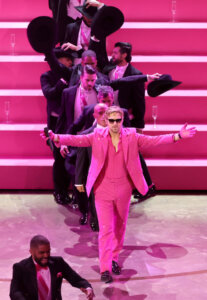
Now we’ve jarringly moved on from the screams of Auschwitz to Ryan Gosling performing “I’m Just Ken” from Barbie. But I can’t really complain — there’s at least 30 back up dancers, the audience is involved; he nailed it. There’s a reason they’ve been teasing this since the ceremony began.
Talya: That performance rocked, primarily because you could tell Gosling was having the time of his life. Big fan of the Oscars being actually fun.
Mira: OK, Oppenheimer started off a little slow, but it just picked up another award, this time for Best Score. Those racing violins did really work for me, I have to say.
PJ: But have you seen the Linkin Park edit?
Mira: Billie Eilish and her brother Finneas accepted their award for Best Song — “What was I Made For,” in Barbie — wearing their Artists4Ceasefire red pins. It’s their second Oscar, after a 2022 win for “No Time to Die” from the James Bond film of the same title. I’m glad to see Norman Jewison acknowledged near the top of the “In Memoriam” montage; Fiddler on the Roof is a huge piece of American film history. (Also, I wish there weren’t dancers during this — the focus should be on the people being remembered.)
Moving on to some of the bigger awards. Kimmel joked that half the audience has gotten bored and is getting “Oppenhammered,” which was a bad pun, yet it pleased me.
More giant wins for Oppenheimer
Talya: Give me a Nicolas Cage-Paul Giamatti buddy comedy now. Watching them vibe over Cage’s introduction of Giamatti’s nomination for Leading Actor was the best chemistry we’ve seen all night, aside from that between Ryan Gosling and his army of Kens. Ben Kingsley calling out Cillian Murphy’s “chutzpah” in Oppenheimer is a nice moment between two non-Jews who have played extremely famous Jews. And Murphy takes it!
Mira: He made a more veiled reference to peace, though unclear if Ukraine, Gaza or both. “For better or for worse, we’re all living in Oppenheimer’s world,” he said in his speech. “So I would really like to dedicate this to the peacemakers everywhere.”
Did any of us think Bradley Cooper would get it for Bernstein? Not I, but I do feel like the two most striking performances were these emotional portrayals of two great Jewish men.
Irene: None of us were huge fans of Cooper’s portrayal, as evidenced by our last round table. Looks like the Academy agrees.
Mira: In a throwback, Schindler’s List having a moment as Spielberg takes the stage to give out Best Director.
PJ: He won for it 30 years ago.
Talya: Another big grab for Oppenheimer, with Christopher Nolan snagging Best Director. Robert De Niro gazes at him lovingly from the audience. Sweet!
Irene: Nolan also shouted out his wife and collaborator Emma Thomas as “producer of all our films and all our children.”
Talya: A music cue from Pirates of the Caribbean? Confusing as a follow up to Nolan’s award, but I’ll take it. (Hans Zimmer, who composed the Pirates soundtrack, is Jewish.)
Mira: I’ll say it: I’m bored by Oppenheimer’s continuing wins. It was the favorite, I know, but these wins and their accompanying speeches have been utterly expected, and no one — including me — seems moved by them. Best Actor and Best Director are two of the biggest awards — say something! Cry! At least have the good taste to look surprised.
Talya: Point well taken, Mira. It feels a little empty because it’s so predictable. Raises some good questions about what the point of these shows is — the Oscars, I think, are supposed to make us feel something. Anyway, my cousin asks an important question: Where is Meryl Streep tonight?
PJ: At least her Jewish son-in-law Mark Ronson is there with her daughter, Grace Gummer.
Irene: I agree. To me, a good Oscars year is one where lot of films share the spotlight, rather than one steamrolling all the others.
Talya: Emma Stone wins Best Actress for Poor Things, and looks rather stunned. I really liked that movie, although I’ve also read some truly excellent criticism of it, and I deeply respect her for opening her speech by admitting that her dress is broken. A nice human moment, very much in contrast to the Oppenheimer polish.
Mira: See, Emma Stone’s speech is what I wanted — and she actually looked totally shocked by the win. Mark Ruffalo looks overjoyed for her. Emotion! Is that so much to ask for?
PJ: People will go after her regardless for being “faux relatable.”
Talya: Host Jimmy Kimmel roasts former President Donald Trump, who’s been critical on social media of Kimmel’s performance tonight, to a very hearty round of applause — “isn’t it past your jail time?” And with that, and a fairly bizarre intro by Al Pacino, Oppenheimer takes best picture. Mazel tov.
Which movies won — and which should have
Mira: This was kind of a boring show! I can’t believe Killers of the Flower Moon didn’t get a single thing. Zeyde Marty does not have that much longer to win more things. I know he’s already won an Oscar — for The Departed in 2006 — but he’s obviously a titan who deserves to win more.
Irene: No flowers for Flowers is particularly a bummer since Lily Gladstone seemed primed to win Best Actress — and would have been a new talent to honor.
Talya: Also almost no love for Barbie — sans Original Song — which was more predictable. In the end, not a single true upset to mention. Status quo going out: same as the status quo going in.
PJ: I hope that the industry takes note and gives us more biopics about Jewish scientists — may we have a Richard Feynman biopic next. (Jack Quaid plays him in Oppenheimer — I think Kevin Pollack needs to do it for the solo movie though.)
Talya: When it comes to takeaways from this ceremony, I think tomorrow I’ll remember “I’m Just Ken,” and that’s just about it.
Mira: I will certainly remember Glazer’s speech, especially given the furor already brewing online.
Irene: Absolutely. It was one of the only moments that deviated from the standard Oscars script.
Mira: Personally, I was really struck by the fact that the #OscarsSoWhite campaign for greater diversity in the awards — which has seemingly really impacted the past several years’ worth of the show — seemed to go out the window tonight. Sure, Oppenheimer was about a Jewish man, albeit one not deeply engaged with his Jewishness, but most of the winners for it were white men who seemed to feel pretty entitled to their awards.
Talya: That’s a great point, Mira. I was trying to put my finger on why these Oscars felt so stale to me overall, and I think the return-to-form qualities of it (not that the form ever changed that substantially) have a lot to do with it. Absent the speeches by Glazer and the team from 20 Days in Mariupol, the show could have aired in 2016 and felt basically exactly the same.
PJ: This has been touted as a really great year in movies, and I think it was, and that a lot of bolder things were given the accolades they deserved. But Oppenheimer in a lot of ways feels emblematic of the times. It’s a great man movie — but the great man here is reckoning with all the harm he has done. In some ways it’s an acknowledgement of a post-#OscarSoWhite world, but finds the loophole. We can still have this kind of movie — and the Academy and box office still eat it up — but it needs to be upfront about how often the white men they celebrate have caused real problems. They still get brownie points for being tormented, though. (And flack for leaving out the victims.)
Mira: But in the end, I think a lot of people still liked it for all the old reasons — a sweeping view of American history, the Great Men and, of course, lots of big explosions.
















